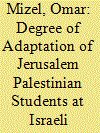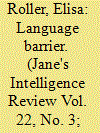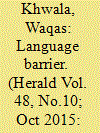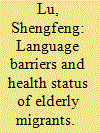| Srl | Item |
| 1 |
ID:
187271


|
|
|
|
|
| Summary/Abstract |
Why do migrants choose some destinations over others? This study explores government language policy and the role of language differences in migration decisions. While governments can use language policy to reduce communication barriers, vernaculars remain critical in terms of regional communication and identity recognition. Using a survey experiment and econometric analyses of nationally representative data from China, the authors examine the communication and cultural roles of language in migration decisions in the context of a unifying common national language. The empirical tests find that migrants prefer destinations where local vernacular languages are more similar to their own, despite a common national language. Once migrants have moved, a common national language helps migrants communicate and therefore remain in their migration destinations, but it does not eliminate the role of the local vernacular as a cultural marker. The result is that both the common language and local vernacular matter for domestic migration, even in a country where the government has promoted a single common language for six decades. The findings have far-reaching implications for migration policy and citizenship management in general.
|
|
|
|
|
|
|
|
|
|
|
|
|
|
|
|
| 2 |
ID:
175136


|
|
|
|
|
| Summary/Abstract |
Several international and local studies have indicated that Arab students face specific difficulties in adapting to and integrating into Israeli colleges. This research aims to identify and analyze the adaptation difficulties faced by Palestinian students in academic colleges in Israel. The research sample consists of Palestinian freshmen from different schools and neighborhoods in East Jerusalem who are studying at a college in West Jerusalem. In-depth interviews were used to document and analyze the experiences and challenges of these students on campus. The interviews revealed a number of factors that impede students’ adaptation and their academic success, and they can be grouped under the concepts of culture shock, language barriers, isolation, and transportation. To deal with these difficulties, students used different strategies such as piety, withdrawal, dependency, and distancing. Implementing specific programs to consider and address specific social and cultural aspects of Palestinian students’ difficulties may contribute to reducing the alienation and culture shock they face in college, such as introducing programs on life skills and treatment of others, hiring faculty who are capable of understanding the Palestinian cultural context and introducing qualified Arab staff in the administrative and service departments.
|
|
|
|
|
|
|
|
|
|
|
|
|
|
|
|
| 3 |
ID:
093930


|
|
|
| 4 |
ID:
141568


|
|
|
| 5 |
ID:
170089


|
|
|
|
|
| Summary/Abstract |
This paper empirically examines the effect of language barrier on elderly migrants' health status by exploiting individual-level data from the “China National Health Survey of Migrants 2015” database. We build an indicator of language barrier with geographical distribution information of Chinese dialect regions, and further separate the language effect from the migration effect by checking whether migrants move into a region with a different dialect. Results indicate a significant and negative impact of the language barrier on the health status of elderly migrants. Specifically, a language barrier results in poorer health conditions for younger elders. The mechanism test shows that a language barrier reduces migrants' abilities to build a social network, which is harmful to their health. Elderly migrants who are less-educated, live in host residence for a shorter time and move for business incentives suffer more from a language barrier. This study proves the power of a verbal language barrier to migrants' health.
|
|
|
|
|
|
|
|
|
|
|
|
|
|
|
|